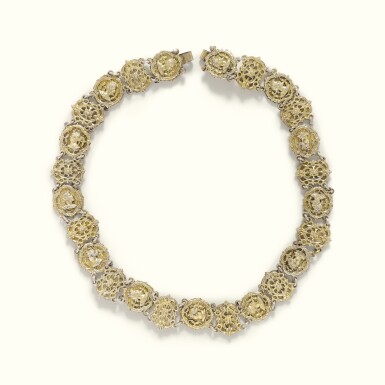SASSOON: A Golden Legacy
SASSOON: A Golden Legacy

A GERMAN SILVER-GILT CHAIN, PROBABLY LATER USED AS A MARRIAGE BELT, MAKER'S MARK EH CONJOINED, PROBABLY FOR EUSTACHIUS HOHMAN OF NUREMBERG, CIRCA 1600
Auction Closed
December 17, 05:06 PM GMT
Estimate
3,000 - 5,000 USD
Lot Details
Description
A GERMAN SILVER-GILT CHAIN, PROBABLY LATER USED AS A MARRIAGE BELT, MAKER'S MARK EH CONJOINED, PROBABLY FOR EUSTACHIUS HOHMAN OF NUREMBERG, CIRCA 1600
formed of twenty-four alternating links of quatrefoil cartouches enclosing classical profile heads of emperors and ladies, separated by openwork scroll rosettes
marked on hook at one end with maker's mark only, cf: Nürnberger Goldschmiedekunst, 2007, pp 182-83
length 32 in.
61.4 cm
Flora Gubbay, Mrs. Solomon David Sassoon (1856-1936), to her son
David Solomon Sassoon (1880-1942), to his son
Rabbi Solomon David Sassoon of Letchworth (1915-1985), and by descent
The orientation of the heads on this chain indicates that it was originally worn vertically. However, its presence in the Sassoon Judaica collection for over a century suggests that it was acquired as a sivlonot, or marriage belt - a purpose for which its male and female profile busts would have been well suited. Sivlonot were a German Jewish tradition dating from the 16th century, when silver or gold chains were sent as a gift by the bridegroom to his future bride. They were worn under the bridal canopy and throughout the following week, then often brought out again for holidays and ceremonial occasions.
